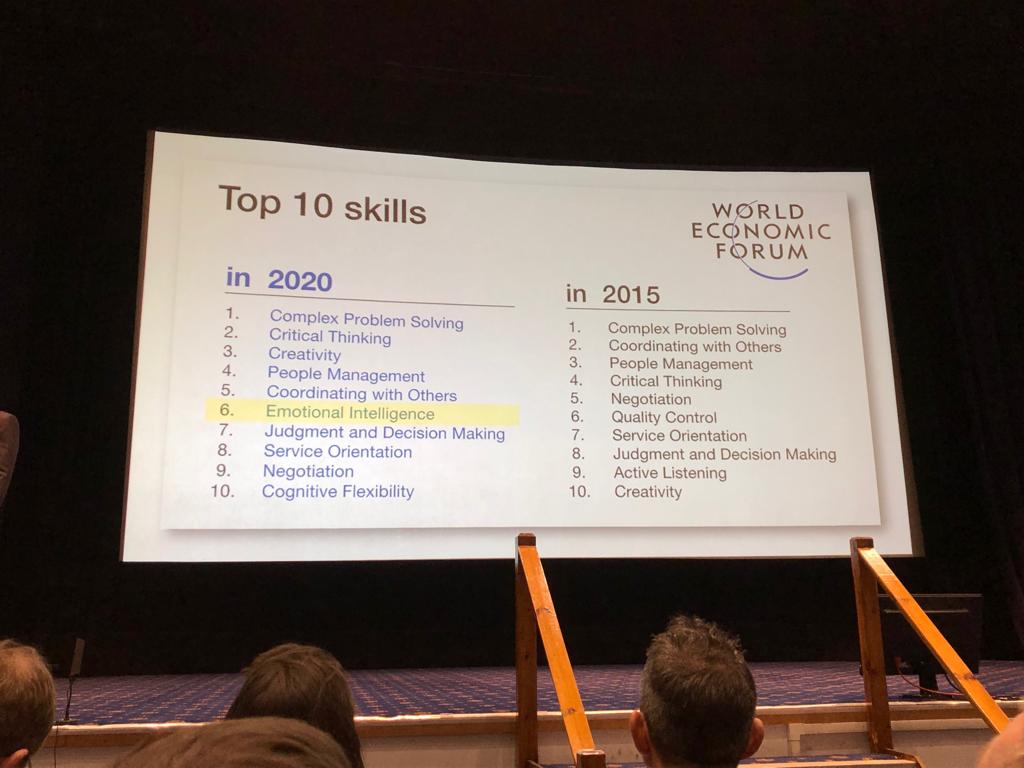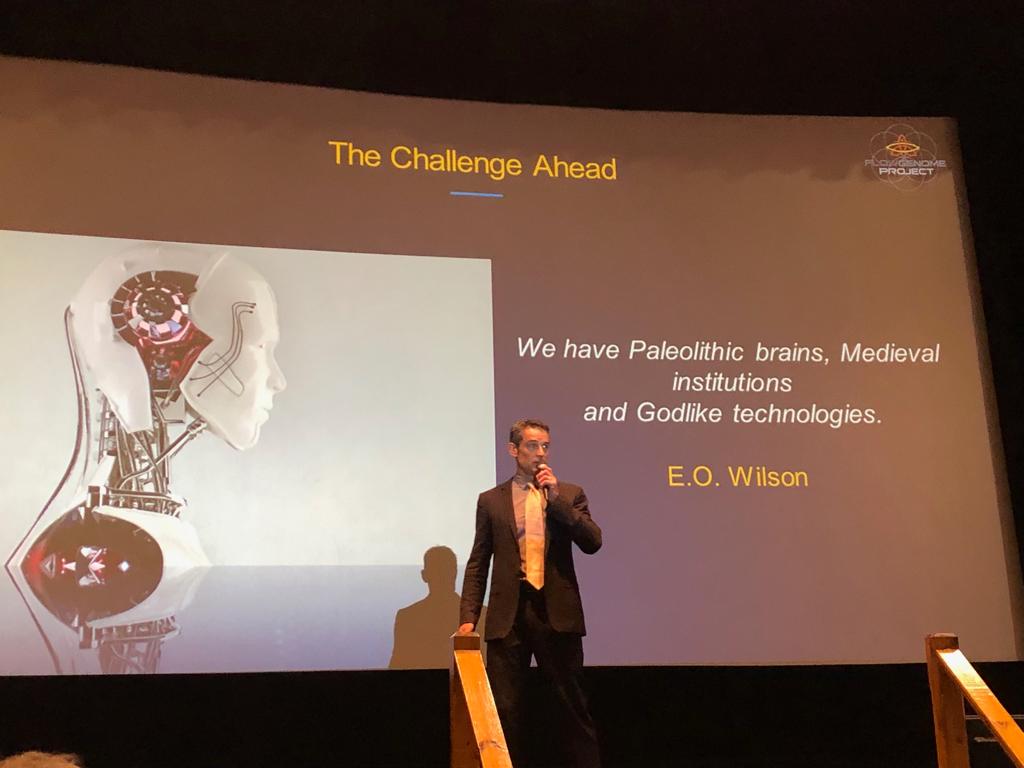Leading In The Digital Age
Centre For Army Leadership (CAL) Conference 2019
In the manicured grounds of the Royal Military Academy Sandhurst, over 1000 delegates from government, business and the military gathered last week at a conference examining the challenges of Leadership in the Digital Age.
The topics raised provided encouragement towards the powerful roles that people still hold in business, even though it may seem as though technology is taking over. The ability to unlock the power of the youngest people in our organisations, or the ‘digital natives’, provides a key to propelling businesses forward. Leaders must now also tackle the ethical challenges that the digital world brings to industries and as a result, value-centred and emotionally intelligent leadership is more relevant than ever.
Skarbek, as a company that helps organisations tackle the challenges wrought by change brought on by the digital revolution, was delighted to be a key sponsor in this thought-provoking event. New technology has long forced a flexible approach to leadership and also means that strategy, operations and tactics are in a state of constant review. In this article, we will outline the key points the speakers made, sharing the challenges outlined and the implications considered.
The British Army – Leadership in the Digital Age
Lieutenant General Chris Tickell CBE – Deputy Chief of the General Staff
General Tickell opened by reflecting on how much the world has changed since the Royal Military College moved to Sandhurst in 1812. Both technology and tactics have evolved, however at the forefront, one thing has remained constant – Leadership. Not just leadership at the top, but at all levels, including across junior ranks and also functional authority in specialist areas. Conflict is now a public matter in the digital world. Every action can be judged and scrutinised, providing more potential to be misrepresented, or outmanoeuvred. As a result, failure can be more obvious and therefore reputation greatly affected. By continuing to recruit and empower people with leadership qualities, we can mitigate the chance of failure. Blind, or unthinking obedience must be avoided and replaced by intellectual engagement, to ensure we are always ahead of the game. Through diversity of thought we can provide fertile ground for innovation. There will of course always be a requirement for a human factor, as we cannot rely on technology alone, however the overarching message is that we should have the ability to adapt and recover should technology fail. Winning nations understand that having an information advantage is the key to success and the best leaders are the ones able to control this information in order to outpace adversaries. Being able to control and tactically release ‘fake news’ stories is now a strategic game changer.
Leaders In Technology And The World
Dr Pippa Malmgren – CEO, Author and Former Presidential Advisor
Dr Pippa Malmgren is the co-founder of H Robotics, a British firm that makes HiSight, a robust modular, SUAV drone system for commercial firms that need aerial intelligence, situational fluency, safety and deep data analytics. Pippa also served President George W. Bush in the White House and on The National Economic Council, where she handled financial market issues and terrorism risks to the economy after 9/11. In her talk, she discussed how data power is the key to strategic success. This is the new space race and it is where our governments are deploying their capital. As a result, we now have super computers that can calculate in 1 second, what would take a human to calculate in 6.3bn years and tech, such as drones, that can be used to provide information of strategic value. But, with the advances of technology, it has also meant we have lost a lot of our privacy. The new maps of today are not of roads, but of data space mapping the motion, emotions and state of mind of individuals. Even down to our household items and other consumer devices, the majority are witness to all of our activities, collecting data points and selling that data to companies to review spending patterns, or behaviours, of individuals. It means we are constantly having to battle with algorithms, compelling us to think one way and this is damaging to diversity of thinking. The increased use of technology means that our leaders today need to look beyond the calculated result, as algorithms can smooth data, meaning they can remove from view what may be important for certain projects. In order to equip leaders today in the digital world, we need to see an increase in reverse mentoring, where the young teach the old, as they may in some cases be more adept and knowledgeable about tech, than their superior. To quote Frank Zappa – “Without deviation from the norm, progress is not possible”.
The Importance Of Emotional Intelligence To The Digital Leader
Dr Jochen Menges – University of Cambridge
“How do you feel right now?” – a question proposed to the audience by Dr Jochen Menges, a university lecturer at the University of Cambridge and a professor of leadership at the University of Zurich. Dr Menges went on to explain that in answering such a simple question, we sometimes lack the vocabulary to express our emotions. In a recent study (the Yale Project), a survey showed that the majority of people in work expressed that they were either stressed, bored, angry, frustrated, or tired. But, why should we care about these emotions, particularly in a work environment? Put simply, because it is the biggest predictor of behaviour and attitude and therefore, if you understand how to feed these emotions, you will be able to boost an individual’s job performance, creativity, motivation, decision making and leadership effectiveness. Change inevitably makes us emotional and this is ever more present in a digital environment. Technology can be utilised to target our emotions and even shift voter behaviour, or persuade us into unnecessary purchases. However, our emotions are also what differentiate us from AI. We may not be able to compete with the mathematical abilities of computers, but neither can we send in mechanicals to build relationships in war-torn countries. The best leaders have a high level of emotional intelligence and this means an ability to recognise the emotions of both yourself and others, but also the ability to regulate and manage those emotions to achieve the desired outcome. The benefits of leaders with high emotional intelligence (EI) is becoming more apparent and equally the negative impact of leaders with low EI can lead to a greater chance of burnout in employees and also hinders innovation, as some may have a fear of speaking up. The preliminary findings of a recent study in the Special Forces in Australia, where one group was provided with a 3-day EI training course and the other not, showed that the training group performed better in mathematical questions under pressure, shooting accuracy and also had an increased ability to withstand pain. It also showed a drop in cortisol levels of that group, leading to the theory that an increase in EI also reduces stress levels. The lessons to take from this are that we should be building emotionally intelligent organisations, where EI is put on the agenda to train leaders, reward those with high EI, but also learn to compartmentalise emotions. After all, there are situations where it is necessary to desensitise, i.e. a surgeon needs to be cool and rational while operating, but then able to switch to being warm and empathetic when talking to a patient.
Hacking Humans: The Source Code Behind Ultimate Performance
Mr Jamie Wheal – Co-author of Stealing Fire and CEO of the Flow Genome Project
Jamie Wheal is the Executive Director of the Flow Genome Project, an organisation committed to research-based training of ultimate human performance. They work with individuals and organizations, teaching them to harness Flow to significantly enhance their performance. Flow is a peak performance state where we feel our best and perform our best. It creates motivation and cuts the path to mastery, accelerating performance by up to 500%. In a flow state, time slows down, self vanishes and action and awareness merge. The technical skills for training are now inadequate to prepare leaders in VUCA (Volatile, Uncertain, Complex and Ambiguous) conditions and so it is critical to get to this flow state and then alter your traits accordingly to deal with the task at hand. In an age of increasing distractions, the issue of focusing on important work is a universal problem. By being able to calm the mind, focus and train others to do the same, teams can place themselves in the correct mental state for creative problem solving. Highly emotionally intellectual leaders are able to train colleagues to achieve a flow state, taking them from feeling overwhelmed, to a feeling of energised focus, bringing back control and becoming more productive as a result.
Panel: The Challenges and Opportunities of Leading in the Digital Age
Mrs Jaya Baloo – Singularity University
Mrs Jaya Baloo, Chief Information Security Officer of KPN, with 18 years of experience in information security, outlined the security issues in the post-Quantum age. “Hackers gonna hack”, warns Mrs Baloo, whether this is for political reasons, profit, or even just for fun, hackers are not going to stop. Hackers will infect millions of devices, solely to get to a handful of targets and even exploit ‘zero days’, vulnerabilities within computer software that is unknown to, or unaddressed by, the host company. These companies can then be held to ransom and information even sold through auction sites on the dark-web. The introduction and development of quantum computers with phenomenal calculating abilities means it is only a matter of time until there is a viable computer that can break our secrets. To combat this is an incredible challenge and to face it we must demand security and privacy as a basic right.
Dr Mareike Möhlmann – Warwick Business School
Dr Mareike Möhlmann, an Assistant Professor of Information Systems & Management at Warwick Business School, discussed whether algorithms can take over management functions, or essentially, become your new boss. Sounds far-fetched? In actual fact, Uber is already using platforms to manage and supervise their drivers. All bookings are made via the platform and by monitoring their every move, drivers can be penalized, or even banned, if their ratings drop below a certain level. However, research has also shown that a lot of drivers are not particularly happy with the lack of human contact. It means that they have no colleagues to socialise with, as they cannot build a personal relationship with the supervisor and therefore potentially leaves them feeling lonely, or unsatisfied with their job. Their ratings reflect their negative feelings, as passengers note the driver complaining about the company systems, or the lack of transparency in knowing how the system works. It seems we still have a way to go until algorithms successfully and completely take over these types of functions, but certainly improvements need to be made in terms of sharing information, inviting feedback from employees, but also there is still a need for human contact in order to build trust between a manager and subordinate.
Mr Frank Dick – European Athletics Coaches Association
Mr Frank Dick, widely acknowledged as one of the outstanding sports coaches and coach mentors in the world, believes that understanding vital people skills is the key to leadership. In the sports world today, we tend to delegate observation to technology, for example, using cameras and then reviewing the process after, rather than observing and learning in the present. Technology is useful for finding the minutiae in the details that give us the edge and make a difference to a successful outcome, but it is up to us to then use this information and learn from it. The science of something can be taught, but the art of what we do must be learned and we must master this for high performance intelligence and to create quality decisions under pressure. We must remember that we are unique and we should aim to be the best version of ourselves to move the world forward. Everyone is born with leadership skills, but not everyone chooses to develop them. If not you, then who and if not now, then when? Be unique, be yourself, be your best!
Conclusion
The digital age, whether you view as frightening, or exciting – people are now more relevant than ever. In a world that continues to change and grow increasingly more technologically advanced and complex, leaders must blend an ability to make sense of the chaos of information available, communicate this to the team effectively and also be guided by ethics and values. Through improving the emotional intelligence of leaders, teams can harness those energies to produce better outcomes. Organisations need to promote the use of a challenge culture and empower junior leaders to up-manage through reverse mentoring. It is vital in a world where data is power, that leaders can utilise technology to gain an information advantage on their competitors, whilst being cognizant of the need to avoid the bias and convergent thinking that technology can drive. Emotional intelligence and diversity of thought is where we stand apart from technology and it is how we will continue to carve out our place in society and push the world forward.





